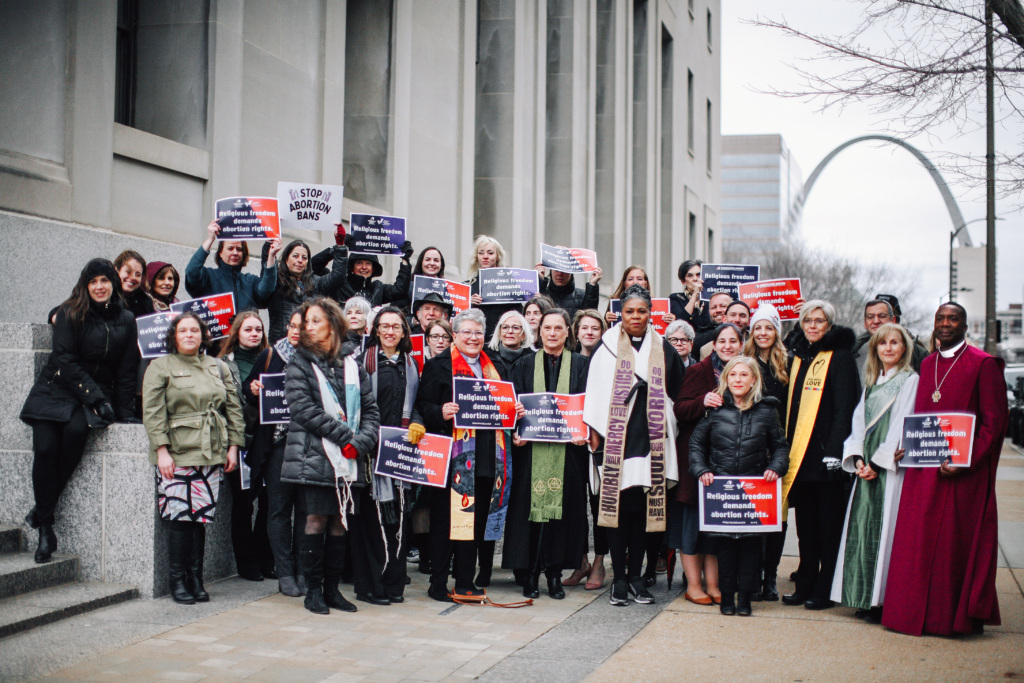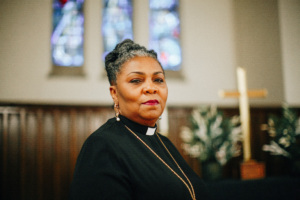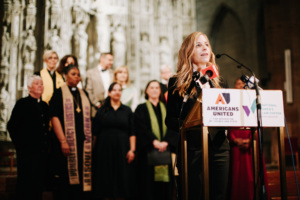When members of the Missouri Legislature were debating a bill that would establish a series of abortion bans and restrictions in 2019, many of the lawmakers didn’t bother to try to hide their religious agenda.
“I just wanted to say that I do truly understand the many, difficult choices that have been talked about today, but to me, God doesn’t give us a choice in this area,” said then-state Rep. Holly Thompson Rehder, now a state senator. “He is the creator of life. And I, being made in His image and likeness, don’t get to choose to take that away, no matter how that child came to be. To me, life begins at conception, and my God doesn’t give that option.”
Then-Rep. Nick Schroer (now also a state senator), the sponsor of House Bill 126, added, “And I’ll say this again, as a Catholic I do believe life begins at conception.”
State Rep. Ben Baker chimed in, “Ladies and gentlemen, from the one-cell stage at the moment of conception, you were already there. We just couldn’t see you yet. And what makes you valuable is that you equally share the image of our Creator. You are His work of art. And the masterpiece of your life will only happen if you allow it to develop.”
Several other lawmakers issued similar statements, some even citing passages from the Bible. They wrote religion into the bill itself, declaring that “Almighty God is the author of life.” They made it clear that their attempt to deny abortion access in the state was anchored in their personal religious beliefs.
Included in the bill was a “trigger ban” that would go into effect if the U.S. Supreme Court struck down Roe v. Wade, the landmark 1973 ruling that established a constitutional right to abortion. When the court did just that this past June, Missouri was left with one of the strictest abortion laws in the country. The procedure is banned except in cases of dire medical emergencies, and even then, abortion care is difficult to access. Reports have already surfaced of people suffering miscarriages who have faced denials of care because of abortion bans, including Mylissa Farmer, a Missourian who was denied emergency abortion care from a Missouri hospital when her water broke at nearly 18 weeks of pregnancy.
The law also targets medical professionals. Doctors who violate the ban can be charged with a felony, which is punishable by up to 15 years in prison; they can also be stripped of their medical licenses.
The law is draconian and imposes a religious viewpoint on all Missourians — a theological perspective that isn’t shared by many of them. That’s why Americans United and its allies are working to change that. On Jan. 19, Americans United, the National Women’s Law Center (NWLC) and the law firm of Arnold & Porter filed a lawsuit in state court on behalf of 13 clergy from six faith traditions challenging Missouri’s abortion bans and several related abortion restrictions as unconstitutionally imposing one narrow religious doctrine on all Missouri residents, thus violating the separation of church and state.
The lawsuit, coming during a week that began with National Religious Freedom Day and Martin Luther King Jr. Day and ended with the 50th anniversary of the Roe decision, had special meaning for the faith leaders, who say it’s critically important to challenge the Missouri abortion bans, which violate religious freedom and the state constitution’s promise of church-state separation.
The clergy members say their various faiths call them to support abortion access because of the critical importance it holds for the health, autonomy, economic security and equality of women and all who can become pregnant. Religious traditions represented by the plaintiffs include Episcopalian, Orthodox Judaism, United Church of Christ, Reform Judaism, Unitarian Universalist and United Methodist. One plaintiff is also a state legislator.

Meet me in St. Louis: Supporters of the AU-NWLC lawsuit rally for choice (Girl Louie)
Rachel Laser, president and CEO of Americans United, traveled to St. Louis to meet the plaintiffs and speak to the media, during a press conference at Christ Church Cathedral.
“Missouri’s abortion bans are a direct attack on the separation of church and state,” Laser said in a media statement. “Religious extremists and their lawmaker allies are forcing all Missourians to live by their narrow beliefs. Religious freedom promises each of us the freedom to make our own decisions about our own bodies based on our own beliefs. That’s why so many faith leaders are speaking out in support of church-state separation as the shield that protects both religious freedom and abortion access for everyone.”
Fatima Goss Graves, president and CEO of NWLC, added, “These abortion bans in Missouri and across the country are attempts by politicians to control and dehumanize us. Rather than letting each person follow their own beliefs when making important decisions about their own bodies, lives and futures, these politicians want to force us to live according to their beliefs. But for many, including the clergy plaintiffs in our case, their faith calls them to support abortion access because it is critical to the health, autonomy, economic security and equality of women and all who can become pregnant. People deserve to live in a world where they are able to make their own personal decisions about their bodies, lives and futures. Today’s lawsuit is an important step in getting us closer to that reality.”
Several of the clergy plaintiffs spoke during the press conference at Christ Church Cathedral. The Rev. Traci Blackmon, the lead plaintiff in the suit and associate general minister of justice & local church ministries for the United Church of Christ, recited the words of the First Amendment and noted that President Thomas Jefferson said they erected a wall of separation between church and state.

The Rev. Traci Blackmon (Girl Louie)
“My friends, without that separation, there is neither religious freedom nor just law,” Blackmon said. “This is why I stand with my colleagues today to bring this suit against a state that I love. The Missouri Constitution ensures strict separation of church and state. Our elected officials have violated their oaths to uphold that constitution by weaponizing religious beliefs to deny abortion access in a state where studies prove these actions are not the will of the majority of the people.”
Maharat Rori Picker Neiss, executive director of the Jewish Community Relations Council of St. Louis, explained that under Jewish law, the life of the mother takes precedence over a fetus.
“Let me be clear,” she said. “I am not here today to advocate that Missouri incorporate a Jewish view on abortion into our laws. I’m here today because none of our religious views, on abortion or anything else, should be enshrined into our laws. And simply put, when Missouri lawmakers state that life begins at conception, that is a theological statement. That is a religious statement.”
Rabbi Jim Bennett, senior rabbi at Congregation Shaare Emeth in Creve Coeur, Mo., told the crowd, “I grew up understanding that the founders of the United States of America were committed to this concept of separation of church and state protecting all people from the imposition of the religious beliefs of others on them. I believed and I learned and I was taught growing up that we are free to believe in America what we want, to practice the faith that we wish, and we are protected from others imposing their faith on us. Missouri’s abortion bans call all of this into question.”
Other faith leader plaintiffs include: Rabbi Doug Alpert, Congregation Kol Ami, Kansas City; the Rev. Jan Barnes, United Church of Christ (retired), Webster Groves; Rev. Cindy Bumb, United Church of Christ (retired), St. Louis; Rabbi Andrea Goldstein, Congregation Shaare Emeth, Creve Coeur; the Rev. Molly Housh Gordon, Unitarian Universalist Church of Columbia; the Rt. Rev. Deon K. Johnson, eleventh bishop of the Episcopal Diocese of Missouri; the Rev. Holly McKissick, Peace Church United Church of Christ, Kansas City; the Rev. Barbara Phifer, United Methodist minister (retired) and state representative in District 90; Rabbi Susan Talve, Central Reform Congregation, St. Louis; and the Rev. Krista Taves, Eliot Unitarian Chapel, Kirkwood, Mo., and First Unitarian Church, Alton, Ill.
The faith leaders are asking the Circuit Court for the City of St. Louis to issue a permanent injunction striking down the abortion bans. The lawsuit demonstrates how Missouri’s statutes and regulations restricting abortion violate three sections of the Missouri Constitution that prohibit state officials from compelling people to support or participate in any religious activities or beliefs, favoring any particular religion or using public money to support religion.
In addition to the state of Missouri, defendants include state and local officials responsible for enforcing or ensuring compliance with the abortion ban, including Missouri Gov. Michael L. Parson, Missouri Attorney General Andrew Bailey and others.
The legal action has significant support in Missouri. The following organizations have endorsed the lawsuit: Access MO; Ashrei Foundation; Americans United, St. Louis Chapter; Como for Choice; Jewish Community Relations Council of St. Louis; ProgressWomen; and St. Mark Hope and Peace Lutheran Church.
In addition, the day after the lawsuit was filed, AU released a video featuring several celebrities who endorsed the legal action. To watch it, go to act.au.org/abortion-access.
The Rev. Blackmon v. State of Missouri lawsuit comes at a time when abortion is increasingly becoming a flashpoint in American politics. In November, voters in five states — Vermont, California, Michigan, Kentucky and Montana — voted to protect abortion access through ballot referenda. (Voters in Kansas did the same last summer.) And while some states have moved to pass laws shoring up abortion rights, others are moving in the opposite direction, putting punitive anti-abortion measures on the books.
The U.S. House of Representatives, now in the hands of the Republican Party, is trying to erode abortion rights. In one of its first votes since taking control of the chamber, the House voted 220-210 Jan. 11 in favor of a bill to subject doctors who perform abortions to criminal penalties under certain conditions. The vote was almost entirely along party lines, with only one Democrat, U.S. Rep. Henry Cuellar (D-Texas), voting in favor. The bill was seen largely as a sop to the GOP’s hard-right base and isn’t expected to gain any traction in the U.S. Senate, which is held by Democrats.
According to the Guttmacher Institute, 12 states have banned abortion outright. Several other states have bans that take effect at six, 15, 20 or 22 weeks, before viability. Challenges to some of these laws have been filed in state courts or are pending.
In Idaho, the state Supreme Court ruled 3-2 last month that the Idaho Constitution does not protect abortion rights. The court let stand a state law banning nearly all abortions in the state and accompanying penalties. But a different result was reached in South Carolina, where the state Supreme Court Jan. 5 struck down an abortion ban that outlawed the procedure after six weeks. The ban, the court ruled 3-2, violated constitutional provisions protecting the right to privacy.
With most of the action moving to the state level, AU’s Laser stressed that the organization will be involved. She said AU members can expect abortion-related litigation in other states.

Reproductive freedom is religious freedom: AU’s Laser kicks off media event (Girl Louie)
“Reproductive freedom and religious freedom are intertwined,” Laser observed in a column that was published in The Progressive the day the Missouri lawsuit was filed. “When your most intimate, personal decisions are held hostage to intolerant religious beliefs, you are not free.
“The American legal system,” she continued, “has adopted a taboo against mentioning religion in legal cases involving abortion. Lawyers and judges go out of their way to avoid discussing religion and religious motivations for abortion restrictions, and treat abortion bans as if they are religiously neutral. Only rarely is someone willing to shatter this polite fiction — to cry out that the emperor has no clothes. If they did, it would quickly become obvious that these bans give the force of law to one narrow religious doctrine. … The separation of church and state shields our shared laws from the influence of any one religion. It frees us to come together as equals and build a stronger democracy. America needs a national recommitment to this separation. Let’s start with Missouri.”


